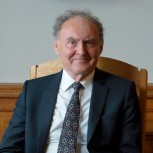
Research Professor
Academic Division: Electrical Engineering
Telephone: +44 1223 7 68631
Email: mew10@cam.ac.uk
Research interests
Professor Welland's research interest lie in nanoscience and nanotechnology in a broad range of both fundamental and applied problems. These include the fundamental properties of nanoscale structures and devices, methods for fabrication of novel nanostructures and devices, nanoelectronics for future generation communications and sensing, elucidating the fundamental growth kinetics of diseases such as Alzheimer’s and the design of nanotechnology-based drug delivery systems for diseases such as glioblastoma, tuberculosis and type II diabetes.
Biography
Sir Mark established a purpose built facility at the University of Cambridge, the Nanoscience Centre in 2001, which undertakes a variety of nano-related research programmes of an interdisciplinary nature. This was the base for the Interdisciplinary Research Collaboration (IRC) in Nanotechnology of which Sir Mark was the Director and whose highly successful legacy has been far reaching. He has substantive international connections in the USA, Japan, China, Europe, India and the Middle East. He established the Science and Technology Research Centre at the American University in Cairo, Egypt which he co-directed from 2003 to 2010 and from 2008 to 2012 was for the UK, the international principal investigator of the £100M World Premier Research Institute in nanomaterials based in Tsukuba, Japan. In 2018 he led the negotiations that resulted in the establishment of the Cambridge University Nanjing Centre for Research and Innovation based in Nanjing, China; a unique collaboration for Cambridge. He has given a number of prestigious lectures that include the Turing Lecture, IEE and British Computing Society, 2002; the Sterling Lecturer, Annual Appointment made by the Sterling group of Universities, 2003; The Annual Materials Research Society of India Lecture, Mumbai, India, 2006 and the Max Planck Society Lecture 2007, MPI, Stuttgart, Germany, 2007. In 2008 in a collaboration with Nokia he won the Red Dot design award for a visionary mobile phone design -Morph. The Red Dot design award is one of the most prestigious international design competitions.
From April 2008 until May 2012, Sir Mark was Chief Scientific Adviser to the UK Government Ministry of Defence. His responsibilities included chairing the Investments Approval Board and the Defence Research and Development Board, acting as UK Principal for the US-UK 1958 Mutual Defence Agreement (MDA), providing scientific advice across Defence and working on cross-Government science issues. He retained his position at Cambridge during the course of his secondment to the MOD. In April 2011, in recognition of Sir Mark's contributions to the 1958 MDA partnership and his leadership and vision in all areas of WMD Defence he was presented with the US Secretary of Defense's Award for Exceptional Public Service. The award is one of the highest awards the Department of Defense can present to a representative of another Government. Also in April 2011, in recognition of his outstanding leadership, wise counsel and his significant contribution to the interests of the United Kingdom and the United States, he received the National Nuclear Security Administration, Department of Energy (NNSA) Gold Medal for Distinguished Service. The NNSA Gold Medal is the highest medal awarded by the NNSA.
Sir Mark was Director of the Nanoscience Centre, University of Cambridge (2001-2008 and 2012-2022), Head of Electrical Engineering, University of Cambridge (2015- 2018), Director of the Maxwell Centre, University of Cambridge (2019-2023), and Master of St Catharine’s College, University of Cambridge (2016-2023). He is currently Deputy Vice-Chancellor, Special Adviser to the Vice-Chancellor on China and Director of Research in Nanoscience at the University of Cambridge.
He was elected an Honorary Fellow of Worcester College, University of Oxford in 2017 and Honorary Fellow of St Catharine’s College, University of Cambridge in 2023. He was awarded Honorary Doctorates in Science from the University of Bristol (2014) and the University of Bath (2024) and an Honorary Doctorate in Engineering from the University of Bradford (2018).
In recognition of his contributions to science and engineering Sir Mark was elected a Fellow of the Institute of Physics in 2001, a Fellow of the Royal Society, a Fellow of the Royal Academy of Engineering and a Fellow of the Institute of Electrical Engineers in 2002, a Foreign Fellow of the National Academy of Sciences India in 2008 and a Foreign Fellow of the Danish Academy of Sciences in 2010. He was a member of the EPSRC Council from 2008 to 2012. Sir Mark was awarded a Knighthood in the Queen's Birthday Honours list in 2011.
